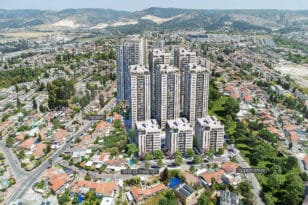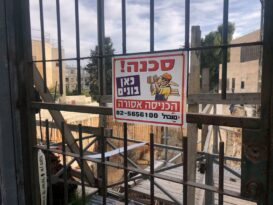In October, there were 2,294 transactions in the country, the lowest number in the past 20 years, except for April 2020, when there was a lockdown due to the COVID-19 pandemic. In the south, which led the volume of home purchases until the war, 124 new apartments were purchased, compared with around 1,000 in August. The supply of homes offered for sale continues to grow and will enable buyers to enjoy affordable prices and opportunities in the coming months.
The Iron Swords War that broke out on October 7, the morning of Simchat Torah, led to an almost complete halt of home purchases in Israel during October. This is according to two publications in recent days, one by the Central Bureau of Statistics (CBS) and the other by the Chief Economist at the Ministry of Finance.
According to the Ministry of Finance, during the month, 2,294 home purchase transactions were recorded – both new and second-hand. This represents one of the lowest figures since home purchase transactions began to be indexed in the early 2000s, and only once, in April 2020, when the first lockdown was imposed in Israel due to the COVID-19 pandemic, was a slightly lower transaction figure of 2,126 recorded. Compared to October 2022, the number of home purchases declined sharply by 55%, and compared to September 2023, there was a decline of 61%.
In the new housing sector, according to the Central Bureau of Statistics, only 930 homes were purchased during the month, reflecting a 59.2% drop in the volume of transactions compared to September 2023. The geographic segmentation of the few transactions shows that the largest number of transactions during the month was conducted in the Tel Aviv District, which includes most of the cities of the Dan region (Tel Aviv, Holon, Bat Yam, Ramat Gan, etc.), and this stood at 247. In the Southern District, which includes the cities hardest hit during the war, such as Ashkelon, Ofakim, and Sderot, 124 new apartments were purchased during October – a drop of about 80% in transaction volumes compared with around 600 apartments purchased in the district in September. About the month of August about 1,000 homes were purchased in the Southern District, this represents an 88% drop in purchase volumes. It should be noted that in the months preceding the war, the Southern District was the district with the highest number of transactions for a large number of months, even more than the Tel Aviv and Central Districts. This is due to the high volume of new construction in several cities in the district, primarily Ashkelon, Netivot, and Kiryat Gat.
This is also reflected in new home sales figures for the three months of August to October, when, ironically, despite the war, southern cities are still at the top for home purchases. Jerusalem had the highest number of new apartments sold – 540, but Ashkelon followed closely behind with 533 new apartments sold, and Ashdod with 488 new apartments sold. In Tel Aviv, by comparison, only 262 new apartments were sold during this period. Less than half compared to Ashkelon, where during October almost no apartments were sold.
The supply of apartments is at its peak
On the flip side, while new home sales have plummeted the number of unsold new apartments has increased. Although new building starts were also severely affected during October, according to Central Bureau of Statistics data, at the end of the month the number of new homes remaining for sale stood at about 62,150, apparently the highest figure of all time.
This means that, at least in the coming months, the housing market will be characterized by exceptionally high supply, an important factor for those who wish to purchase an apartment these days, who will have an advantage in finding opportunities and price negotiations.
Data from the Chief Economist at the Ministry of Finance indicates another interesting effect, specifically on the second-hand housing market, whose damage was even greater than that of the new home market. Second-hand sales in October stood at 1,477 homes, the lowest level since at least the early 2000s. According to the survey, it was found that “an analysis of sales during the month shows that the impact of the war on this market segment was higher than in the segment of new apartments on the open market, probably due to, among other things, a relatively higher preference after the outbreak of the war for apartments with a safe room.”
The chief economist concluded the review by saying that “preliminary data for November also indicate a low level of transactions, but higher than that of October.” It seems therefore that as the public in Israel returns somewhat to a state of routine, the number of transactions will continue to increase until it returns to normal.
Everybody wants a Buyitinisrael, now more than ever before. Whether you’re thinking about Aliyah, looking for a home or a haven, or want to support the Israeli economy, drop us a line, when you’re ready to talk. Whatever the reason, Buyitinisrael.



